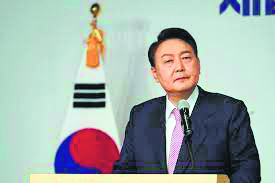
South Korean President Yoon Suk Yeol slammed the purported illicit arms deal between North Korea and Russia, saying he’ll emphasize its far-reaching security implications and discuss international response during the Asia-Pacific Economic Cooperation summit in San Francisco this week.
In written responses to questions from The Associated Press ahead of the APEC meeting, Yoon also said that North Korean provocations will invite immediate retaliation by South Korean and U.S. forces. There are concerns that North Korea might miscalculate and make a move against the South while the world is focused on the conflicts in the Middle East and Ukraine.
“An effective way to prevent North Korea from miscalculating is to demonstrate our robust deterrence capabilities and determination towards North Korea based on the solid (South Korea) -US joint defense posture,” Yoon said.
“North Korea’s provocations will not only fail to achieve its intended goal but also result in immediate and strong retaliation from (South Korea)-U.S. alliance,” he said.
There are concerns that Russia’s protracted war on Ukraine and the raging conflict between Israel and Hamas are adding to complexities and uncertainties over the security situation on the Korean Peninsula.
Some experts say North Korea’s reported pursuit of sophisticated Russian weapons technologies in return for its supply of conventional arms for Russia’s war in Ukraine could help the North modernize its nuclear-capable missiles targeting South Korea and the U.S. The experts also worry that Washington’s preoccupation with Ukraine and Israel might prompt North Korea to conclude that the US security posture on the Korean Peninsula has weakened and launch surprise attacks or other provocations against South Korea.
Since taking office in May last year, Yoon, a conservative, has made a reinforced military partnership with the US the centre of his foreign policy in response to North Korea’s evolving nuclear threats. Since his inauguration, Yoon said that North Korea has test-launched a total of 87 ballistic missiles.
Despite this, many foreign analysts assess North Korea still doesn’t possess functioning nuclear-tipped missiles. But they say that Russian support could help North Korea overcome the last remaining technological hurdles to acquire such weapons.
Both North Korea and Russia have dismissed as groundless the speculated weapons transfer deal, which would violate UN Security Council resolutions that ban any arms trade to and from North Korea.
“These two countries’ military cooperation… not only poses a serious threat to the security of the Korean Peninsula, Northeast Asia and Europe but also undermines the universal rules-based international order,” Yoon said.
At meetings with many world leaders during the 21-member APEC meeting, Yoon said he’ll underscore such diverse security threats posed by the “illegal” North Korean-Russian cooperation and discuss ways to strengthen cooperation.
One area where North Korea is believed to be receiving Russian technological assistance is a spy satellite launch program. After two consecutive failures to put its first military spy satellite into orbit in recent months, North Korea vowed to make a third launch attempt in October. But it didn’t follow through. South Korean officials suspect it that was likely because North Korea has begun receiving Russian help.
Yoon said the main objective of North Korea’s spy satellite launch, which involves a rocket, is to advance its nuclear delivery vehicle. He cited U.N. bans on any satellite launches by North Korea, because the world body views them as cover for testing its long-range missile technology.
North Korean leader Kim Jong Un previously said he needed a spaced-based surveillance system to better monitor South Korean and US activities and enhance the attack capability of his nuclear missiles.